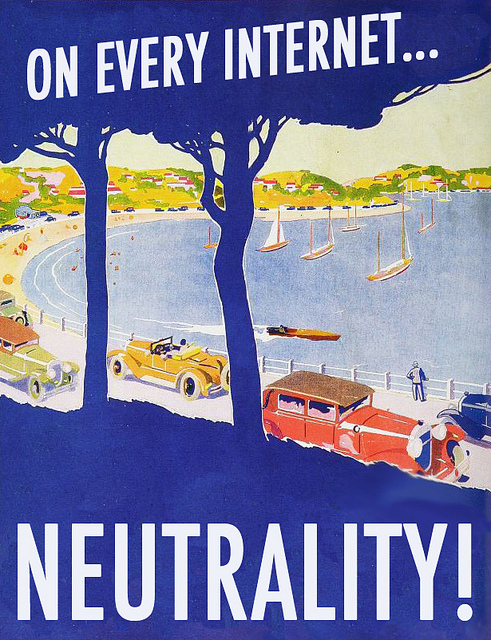Please help rabble.ca stop Harper’s election fraud plan. Become a monthly supporter.
All the recent publicity framing net neutrality as the central contestation of our time has obscured the fundamental reality that the Internet hasn’t been ‘neutral’ for years.
For the average person, supporting net neutrality — the idyllic principle that all traffic on the Internet should be treated equally — probably seems like common sense. After all, I think when most of us think of cyberspace, we tend to imagine an archetypal Web of open and fluid information freed from the borders and conventions that constrain the non-virtual world.
So, when the FCC recently proposed new regulations that, if implemented, would eradicate net neutrality, it is no surprise thousands of users in both the U.S. and Canada were outraged. The new regulations would allow Internet service providers to offer differential service through creating fast-lanes for corporations who can afford to pay more, while regulating those of us who can’t to a lower level of accessibility online.
This issue affects Canadians because even though the FCC is technically based in the U.S., most of Canada’s everyday web traffic passes through U.S. servers, and is therefore automatically subject to U.S. regulation. What’s more, if the tiered system is approved in the U.S., it’s a sure bet monopolistic Canadian telecoms will push for some sort of innocuous-sounding ‘regulatory harmonisation‘ in order to justify implementing similar policies up here. This would mean many more instances of Internet service providers (ISPs_ like Bell discriminating against consumers by charging up to 800 per cent more for access non-Bell content.
Thus in an attempt to fight for our digital democratic rights, journalists have proceeded to write impassioned editorials, digital advocacy groups such as Openmedia.ca, Fight for the Future and the Electronic Frontier Foundation have each launched massive online petitions, and the FCC‘s website has even been forced to shut down on multiple occasions after being overloaded with comments from anti-regulatory Internet users.
These efforts, and all the others like them being mounted in order to pressure the FCC into withdrawing their proposal to allow privileged companies to implement Internet fast-lanes while the rest of us toil away at slower speeds, highlight how strongly thousands of users feel that the fight for net neutrality is an essential struggle of our generation.
And while in principle I couldn’t agree more with the cause, the problem with this logic is that it’s based on an archaic understanding of how the modern Internet actually works.
Nowadays, fears of a two-tiered system are redundant as powerful tech empires such as Google, Facebook and Apple already run dedicated computer servers inside ISPs like Rogers, Bell and Telus. As such, they have direct and unencrypted access to all the data that runs through the average person’s router and thus already benefit from what is essentially a virtual back door into our information.
For as the person who coined the term net neutrality, professor Tim Wu, points out, on the modern Internet the real issue is not fast-lanes or tiered systems, it’s that a small number of ISPs now control how the flows of information reach users, and as such, they can grant privileged access to institutions they favour, and block out those they don’t — all outside of the legal reach of privacy watchdog groups and government regulators.
Remember last years‘ Snowden revelations, those disconcerting realizations that our data was being collected up by government surveillance agencies to keep tabs on us?
Well those leaks were only made possible because the tech institutions and ISP providers who have special privileges in the virtual world are more than willing to surrender our personal data directly to government agencies upon request — in 2011 alone, the Harper government made 1.2 million successful requests for information.
What’s more, Canadian ISPs have also taken to blacking out websites that put out messages they disagree with. For example, when its workers were striking in 2005, Telus censored all access to a website run by the Telecommunications Workers Union (TWU) on the grounds that their views posed a threat to Telus’ business interests.
But beyond all the leaks and censorships, debates surrounding net neutrality tend to glaze over the largest tiered structure of all — Internet access in Canada is some of the most expensive in the world, and regardless of how neutral or non-neutral the Internet may be, many Canadians can’t even afford to access online spaces in the first place.
So of course, fighting the FCC’s newest proposal is important — open accessibility for activists, unions and alternative medias will become even more contingent if regulators are permitted to further erode the fundamental principles of cyberspace for profit.
However, it is also important to remember that the current status quo is not a neutral net — it is one dictated by monolithic tech empires and autocratic ISPs. If we really want an Internet that matches up with our egalitarian imaginations, we, the users, are going to have to get a lot more radical than a few angry editorials and online petitions.
Adam Kingsmith is a writer, digital activist, and PhD student in political science at York University, where his research explores radical political subjectivities within socio-digital spaces.
Photo: flickr/BrokenCities



